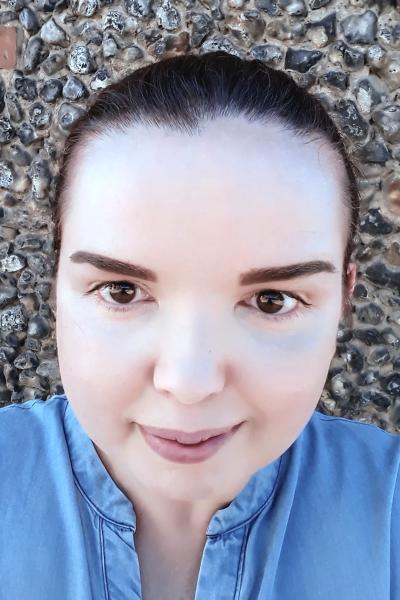Giovanna Zinzalla
Gästforskare vid Institutionen för farmaceutisk biovetenskap; Forskning; Farmaceutisk cellbiologi
- E-post:
- giovanna.zinzalla@uu.se
- Besöksadress:
- BMC, Husargtan 3
75124 uppsala - Postadress:
- Box 591
75124 Uppsala
- ORCID:
- 0000-0002-1130-4865
Mer information visas för dig som medarbetare om du loggar in.
Kort presentation
Denna text finns inte på svenska, därför visas den engelska versionen.
My research focuses on determining at the molecular level the mechanisms regulating the interactions between two master regulators of transcriptions, the MYC transcription factor and the SWI/SNF chromatin remodelling complexes, in physiological conditions and in human diseases. My team's research work encompasses the use of chemistry, biochemistry, biophysics and structural biology. The ultimate goal is to develop therapeutic agents and new approaches for regenerative medicine.
Nyckelord
- chemical biology
- chromatin remodelling complexes
- medicinal chemistry
- organic chemistry
- protein science
- protein-protein interactions
- structural biology
- transcription factors
Biografi
Denna text finns inte på svenska, därför visas den engelska versionen.
Dr. Zinzalla obtained her first class honours Laurea in Chemistry (equivalent to MChem) from the University of Milan (Italy) and carried out her PhD studies with Prof. Stefano Maiorana and Dr Clara Baldoli also at the University of Milan. Her research focused on developing new metal complex conjugates of Peptide Nucleic Acids (PNAs) as biosensors, and she investigated novel trace-less linkers for solid-phase synthesis of drug-like small molecules in collaboration with GlaxoSmithKline. In 2004 she was awarded a Marie Curie EIF Individual Research Fellowship and appointed as postdoctoral research assistant at the Department of Chemistry of the University of Cambridge (UK) with Prof. Steven Ley. Within the Ley group she initiated a project focused on exploring the role of molecular diversity for drug discovery, with the design of natural product-like compounds as novel therapeutic agents.
In June 2006 she joined the School of Pharmacy, University College London (UK) as a senior research fellow funded by Cancer Research UK (CR UK), within the CR UK Drug Discovery unit headed by Prof. David E. Thurston. As a co-principal investigator of a CR UK Small Molecule Drug Discovery Initiative program she led the research aimed at discovering protein-protein interaction inhibitors of transcriptional factors such as Hypoxia Inducible Factor 1 (HIF-1) and Signal Transducer and Activator of Transcription 3 (STAT3 ).
In January 2012 she took up the position at the Karolinska Institutet and started her own research group as an assistant professor in chemical biology and principal investigator at the MTC Department and within the Centre for Advanced Cancer Therapies (ACT). Since 2019 Dr Zinzalla is a long-term visiting academic/PI in the Department of Pharmacology; and a Bye-Fellow, Tutor and Director of Studies in Natural Sciences (Biological) of the Lucy Cavendish College, where she teaches pharmacology to students taking Natural Sciences Tripos and Medicine courses. In 2024 she joined the Department of Pharmaceutical Biosciences, Uppsala University.
External links:
-
LinkedIn webpage
-
University of Cambridge webpage
Forskning
Denna text finns inte på svenska, därför visas den engelska versionen.
HOW TRANSCRIPTIONAL REGULATORS CONTROL GENE EXPRESSION PROGRAMS and CELL FATE in NORMAL and MALIGNANT CELLS
How the transcriptional machinery orchestrates gene expression programs during development, renewal and in response to environmental signals is one of the outstanding questions in biology. I tackle this fundamental problem by focusing on determining at the molecular level the mechanisms regulating the interactions between transcription factors and their interactions with co-factors, especially with epigenetic regulators.
My research approaches encompass the use of chemistry, biochemistry, biophysics and structural biology. The ultimate goal is to develop therapeutic agents to treat human diseases, and new approaches for regenerative medicine.
We have been focusing on two key molecular machineries: (1) MYC and other members of its Basic-Helix-Loop-Helix-Zipper (bHLHZip) network of transcription factors; and (2) the SWI/SNF (BAF) chromatin remodelling complexes.
We work on determining: how the MYC transcription factor cooperation leads to gene repression; and how the MYC extended network of bHLHLZ transcription factors, i.e., the c-MYC like MONDOA/ChREBP paralogs, regulate metabolism.
Our projects on the SWI/SNF complexes are currently directed to understand: how these chromatin remodelling complexes control MYC gene expression; and how the BAF60 and the BAF155/170 subunits, respectively, mediates interactions with diverse transcription factors with roles in cellular processes, such as regeneration, cardiac development and metabolism. We are also exploring ways to target the SWI/SNF complexes for the development of new therapies.
RESEARCH COLLABORATIONS (alphabetical order)
Prof. Don Ayer, Huntsman Cancer Institute, University of Utah, USA; Dr Mark Bycroft, University of Cambridge, Cambridge, UK; Prof. Gerard Evan, University of Cambridge, UK; Prof. Laura Itzhaki, University of Cambridge, Cambridge, UK; Prof. Lars-Gunnar Larsson, Uppsala University, Sweden; Prof. Mark Rubin MD, Bern Center for Precision Medicine (BCPM), University of Bern, Switzerland; Prof. Sophia Yaliraki, Imperial College London, UK.
ALL PUBLICATIONS ORCID

